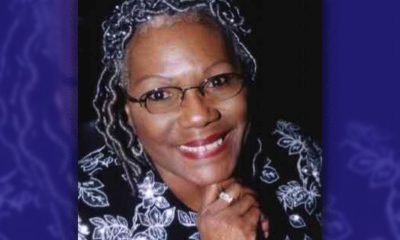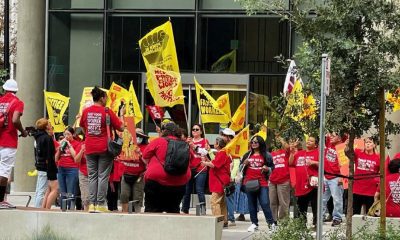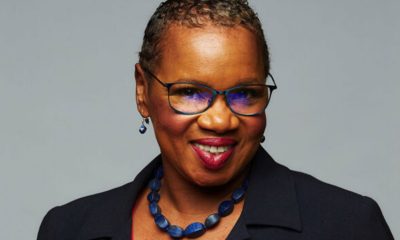Business
Starbucks to Expand Online College Tuition Program

In this Nov. 24, 2014, file photo, barista Jay Rapp prepares a Chestnut Praline Latte at a Starbucks store in Seattle. Starbucks on Monday, April 6, 2015, said its workers can now have four years of tuition covered for an online college degree from Arizona State University instead of just two, marking the latest sign that companies are rethinking their treatment of low-wage workers. (AP Photo/Ted S. Warren, File)
CANDICE CHOI, AP Food Industry Writer
NEW YORK (AP) — Starbucks says its workers can now have four years of tuition covered for an online college degree from Arizona State University instead of just two, marking the latest sign that companies are rethinking their treatment of low-wage workers.
The Seattle-based coffee chain says the decision is part of its commitment to “redefine the role and responsibility of a public company.”
The expansion of the program comes as employers increasingly seek to win favor with customers by cultivating their images for being socially responsible. Last week, McDonald’s also announced it was expanding a college tuition assistance program to workers at its more than 14,300 U.S. stores. At its company-owned stores, McDonald’s said workers would get a pay bump and be able to earn paid time off as well.
Among the other major employers that have announced wage hikes recently are Wal-Mart Stores and Gap Inc.
The public declarations of improved pay and benefits come as the growing income disparities between the richest Americans and everyone else have become a major political issue. Last year, more than a dozen states and multiple cities raised their local minimum wages, according to the National Employment Law Project. And since late 2012, ongoing protests by labor organizers have highlighted the financial hardships of fast-food and retail workers, and generated negative publicity for McDonald’s and Wal-Mart in particular.
“People understand the glaring differences between those at the top, and workers who aren’t making that much,” said Tsedeye Gebreselassie, a staff attorney at the National Employment Law Project, which gets funding from unions and has supported the protests for pay of $15 an hour and unionization for low-wage workers.
Already, Starbucks is known for offering workers health care coverage and company stock, which are considered unusual benefits in the retail and fast-food industry. And Starbucks CEO Howard Schultz said the coffee chain’s education program is helping build customer loyalty as well.
“Consumers want to choose those companies that have like-minded values as them,” he said.
Additionally, Schultz said Starbucks is fighting to “attract and retain great people,” and that workers have higher expectations from employers.
“The benefits of yesterday may not be as relevant today,” he said.
The tuition program is a collaboration between Starbucks and Arizona State University, which charges roughly $30,000 for two years of its online degree program. Without providing details, Arizona State University President Michael Crow said the school will “more than break even” with the tuition it collects for Starbucks workers. He said that money will be reinvested into expanding educational opportunities.
As part of the agreement with Starbucks, ASU is providing an upfront discount or scholarship of about 42 percent of the standard tuition for eligible workers at the chain’s company-owned U.S. stores. That means Starbucks would be responsible for up to 58 percent.
The amount Starbucks pays stands to be less, however, since many workers are expected to qualify for federal Pell grants and other aid as a result of their limited incomes. Workers would pay whatever costs are leftover, and Starbucks would reimburse them at the end of each semester.
Previously, Starbucks had said it would pay back workers after the completion of 21 credits, which had prompted some criticism that workers were being forced to wait too long for reimbursement.
So far, Starbucks Corp. says nearly 2,000 workers have enrolled for the program; the chain has more than 140,000 workers at its company-owned U.S. stores and support centers. Workers can pick from a variety of fields to study and are not required to stay with Starbucks after earning their degrees.
As part of the initial agreement, Starbucks agreed not to promote undergraduate degrees from other universities to its workers, and Arizona State University agreed not to enter into a similar partnership with another company without prior approval from Starbucks for the first couple years of the program.
____
Follow Candice Choi at www.twitter.com/candicechoi
Copyright 2015 The Associated Press. All rights reserved. This material may not be published, broadcast, rewritten or redistributed.
Activism
Oakland Post: Week of December 25 – 31, 2024
The printed Weekly Edition of the Oakland Post: Week of December 25 – 31, 2024

To enlarge your view of this issue, use the slider, magnifying glass icon or full page icon in the lower right corner of the browser window. ![]()
Bay Area
Glydways Breaking Ground on 14-Acre Demonstration Facility at Hilltop Mall
Glydways has been testing its technology at CCTA’s GoMentum Station in Concord for several years. The company plans to install an ambitious 28-mile Autonomous Transit Network in East Contra Costa County. The new Richmond facility will be strategically positioned near that project, according to Glydways.

The Richmond Standard
Glydways, developer of microtransit systems using autonomous, small-scale vehicles, is breaking ground on a 14-acre Development and Demonstration Facility at the former Hilltop Mall property in Richmond, the Contra Costa Transportation Authority (CCTA) reported on social media.
Glydways, which released a statement announcing the project Monday, is using the site while the mall property undergoes a larger redevelopment.
“In the interim, Glydways will use a portion of the property to showcase its technology and conduct safety and reliability testing,” the company said.
Glydways has been testing its technology at CCTA’s GoMentum Station in Concord for several years. The company plans to install an ambitious 28-mile Autonomous Transit Network in East Contra Costa County. The new Richmond facility will be strategically positioned near that project, according to Glydways.
The new Richmond development hub will include “over a mile of dedicated test track, enabling Glydways to refine its solutions in a controlled environment while simulating real-world conditions,” the company said.
Visitors to the facility will be able to experience on-demand travel, explore the control center and visit a showroom featuring virtual reality demonstrations of Glydways projects worldwide.
The hub will also house a 13,000-square-foot maintenance and storage facility to service the growing fleet of Glydcars.
“With this new facility [at the former Hilltop Mall property], we’re giving the public a glimpse of the future, where people can experience ultra-quiet, on-demand transit—just like hailing a rideshare, but with the reliability and affordability of public transit,” said Tim Haile, executive director of CCTA.
Janet Galvez, vice president and investment officer at Prologis, owner of the Hilltop Mall property, said her company is “thrilled” to provide space for Glydways and is continuing to work with the city on future redevelopment plans for the broader mall property.
Richmond City Manager Shasa Curl added that Glydways’ presence “will not only help test new transit solutions but also activate the former Mall site while preparation and finalization of the Hilltop Horizon Specific Plan is underway.
Activism
2024 in Review: 7 Questions for Outgoing Stockton Mayor Kevin Lincoln
Lincoln’s decision to run for mayor stemmed from his love of people and his desire to serve his city. He prioritized resolving issues, including homelessness and public safety, among others. Lincoln, a Republican, will transition out of his role as mayor on Dec. 31, after an unsuccessful campaign to represent the 9th Congressional District.

By Edward Henderson
California Black Media
Born in Stockton, Mayor Kevin Lincoln says his Army upbringing inspired him to serve others.
Lincoln joined the United States Marine Corps in 2001 and was later assigned to Marine One, serving during President George W. Bush’s administration.
Following his military service, Lincoln worked for one of the nation’s top private security companies for eight years in Silicon Valley. In 2013, he resigned from his corporate position to give back to his community in Stockton through full-time ministry at a local church.
Lincoln’s decision to run for mayor stemmed from his love of people and his desire to serve his city. He prioritized resolving issues, including homelessness and public safety, among others.
Lincoln, a Republican, will transition out of his role as mayor on Dec. 31, after an unsuccessful campaign to represent the 9th Congressional District.
Recently, California Black Media (CBM) spoke with Lincoln. He reflected on his accomplishments this year and his goals moving forward.
Responses have been edited for length and clarity.
Looking back at 2024, what stands out to you as your most important achievement and why?
What I prioritize for our city council is our youth. They are the future — not only our city, but this region as a whole.
We were able to invest over $6 million in youth programming and workforce development, and partner with 14 different community-based organizations. We were able to employ over 600 young people through the city of Stockton. We launched even our first ever summer jobs program for the city of Stockton.
How did your leadership and investments contribute to improving the lives of Black Californians?
It’s about giving people a seat at the table, and not necessarily waiting for people to come to me, but me going to the community, making myself accessible, meeting our community at the point of their need, where they’re at.
What frustrated you the most over the last year?
It’s politics. Because unfortunately, there’s politics in everything. And I say politics impedes progress. You can have a policy, a solution that may not necessarily be 100% perfect. But it’s a good solution for everybody. But because we allow politics to get in the way based off our personal ideologies, oftentimes we can miss opportunities to make an impact for the benefit of the whole.
What inspired you the most over the last year?
My biggest inspiration has been the community and our ability to work together. What’s unique about Stockton, one in 20 jobs are nonprofit jobs in the city of Stockton and even San Joaquin County.
What is one lesson you learned in 2024 that will inform your decision-making next year?
To stay focused. In politics, there’s a lot of opportunity for distractions. There are a lot of influences from the outside — good, bad and indifferent. It’s important to stay focused, have a clear vision, and be committed to that vision.
In one word, what is the biggest challenge Black Californians face?
Economics. When the economy is not healthy, when we’re not thriving, we’re limited. Opportunities are limited.
What is the goal you want to achieve most in 2025?
I just want to continue to be a servant leader and serve our community in whatever capacity I am in.
-

 Activism4 weeks ago
Activism4 weeks agoOakland Post: Week of November 27 – December 3, 2024
-

 Activism2 weeks ago
Activism2 weeks agoButler, Lee Celebrate Passage of Bill to Honor Congresswoman Shirley Chisholm with Congressional Gold Medal
-

 Activism2 weeks ago
Activism2 weeks agoPost News Group to Host Second Town Hall on Racism, Hate Crimes
-

 Activism2 weeks ago
Activism2 weeks agoDelta Sigma Theta Alumnae Chapters Host World AIDS Day Event
-

 Business2 weeks ago
Business2 weeks agoLandlords Are Using AI to Raise Rents — And California Cities Are Leading the Pushback
-

 Activism3 weeks ago
Activism3 weeks agoOakland Post: Week of December 4 – 10, 2024
-

 #NNPA BlackPress4 weeks ago
#NNPA BlackPress4 weeks agoNational Action Network Announces 2025 Inauguration Day Rally
-

 Activism2 weeks ago
Activism2 weeks agoOakland Post: Week of December 11 – 17, 2024



























































